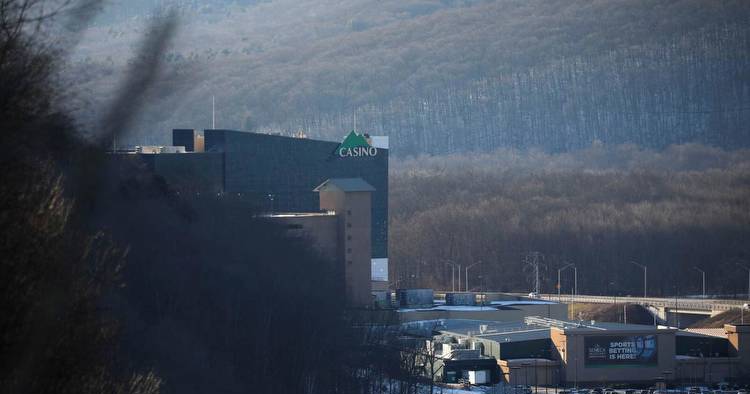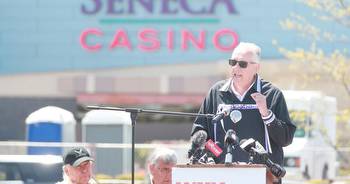After banking freeze, Senecas pay state nearly $565 million in casino revenues

Facing a state-led freeze on its bank accounts, the Seneca Nation of Indians said Tuesday that it had agreed to send New York State $564.8 million in casino revenues that the tribe had long claimed it did not have to pay.
The payment, approved by the Seneca Nation Council a day earlier, appears to resolve for now a five-year dispute over whether the tribe has to continue to pay 25% of its slot machine revenues to the state, which then shares about a quarter of those proceeds with Buffalo, Niagara Falls and Salamanca – the cities where the casinos are located.
The tribe had long contended that while it agreed to pay 25% of slot proceeds to the state in the last seven years of the 14-year agreement it struck with the state in 2002 to create the casinos, it did not have to pay the money under the seven-year extension of that compact that took effect in 2017.
The Senecas lost arbitration and court battles on the issue, but paid up only after Gov. Kathy Hochul acted to freeze tribal bank accounts over the weekend – a move that prevented the tribe from paying its bills and even blocked some of its members from withdrawing money from ATMs.
Seneca Nation President Matthew Pagels indicated the tribe had no choice but to send the money to the state.
“The Seneca Nation simply could not stand by while New York State intentionally attempted to hold the Seneca people and thousands of Western New Yorkers hostage,” Pagels said in a statement. “The state may think it’s appropriate to force an elder to go without their diabetes medication or a family, already dealing with the financial impacts of the pandemic, to go without a paycheck. The Seneca Nation won’t let that happen. We will not let New York State strangle the people of Western New York.”
Hochul's aides asked KeyBank, which holds the Seneca Nation's bank accounts, to freeze them under a state law that allows creditors to seek such action to force debtors to pay up. The Hochul administration did that amid ongoing federal court action in Buffalo that aimed to accomplish the same thing and despite the Senecas' promise to pay up if a federal review concluded that they should.
The governor's spokeswoman, Hazel Crampton-Hays, said the administration hopes the move leads to "swift resolution" of the longstanding dispute.
"Since the beginning of her administration, Gov. Hochul has been committed to resolving this issue and receiving the funds the state and local governments are owed," Crampton-Hays said. "The courts have consistently ruled in the state's favor, and the state has negotiated in good faith and met every hurdle. After the nation once again failed to make payments under the terms of an amicable agreement, the state took action in the courts to turn over the owed funds."
The freeze meant that many Senecas found they could not conduct basic financial transactions starting last Saturday.
"This is three days now, and there are already checks out there that are bouncing," said Leslie Logan, a founding member of the Seneca Mothers of the Nation, a group that has resisted paying the funds to the state. "There are homeowners payments that cannot be paid. We can't issue invoices for pharmaceuticals. There were all kinds of repercussive impacts that were crippling, just crippling."
A Seneca Nation spokesman said, though, that KeyBank was in the process of lifting the account freeze Tuesday.
An attorney for the Seneca Mothers – former Seneca Nation president Robert Odawi Porter – said the nation should not give up the fight even though the Council had agreed to make the payment.
Porter questioned how the state could use one of its own laws to freeze the bank accounts of a sovereign Indian nation. He also noted that the U.S. Department of the Interior had questioned whether the Senecas actually owe the money, given that it was collected under an extension of the deal with the state that the federal government never reviewed.
"To me, it's a fraud," Porter said of the state's move to force the Senecas to pay the money. "And if the money somehow ends up transferring over to the state, then just like any fraud, we know who did it, and if it's an illegal payment, we're going to get it back."
The seven-year extension of the gaming compact expires in December 2023. Pagels, the current Seneca president, indicated that negotiations for the next gaming compact won't exactly start on good terms.
“Don’t use the people of Western New York as pawns in your obvious desire to destroy the Seneca Nation,” he said. “You have an obligation under federal law to negotiate a compact with the Seneca Nation in good faith. Honor it.”






































